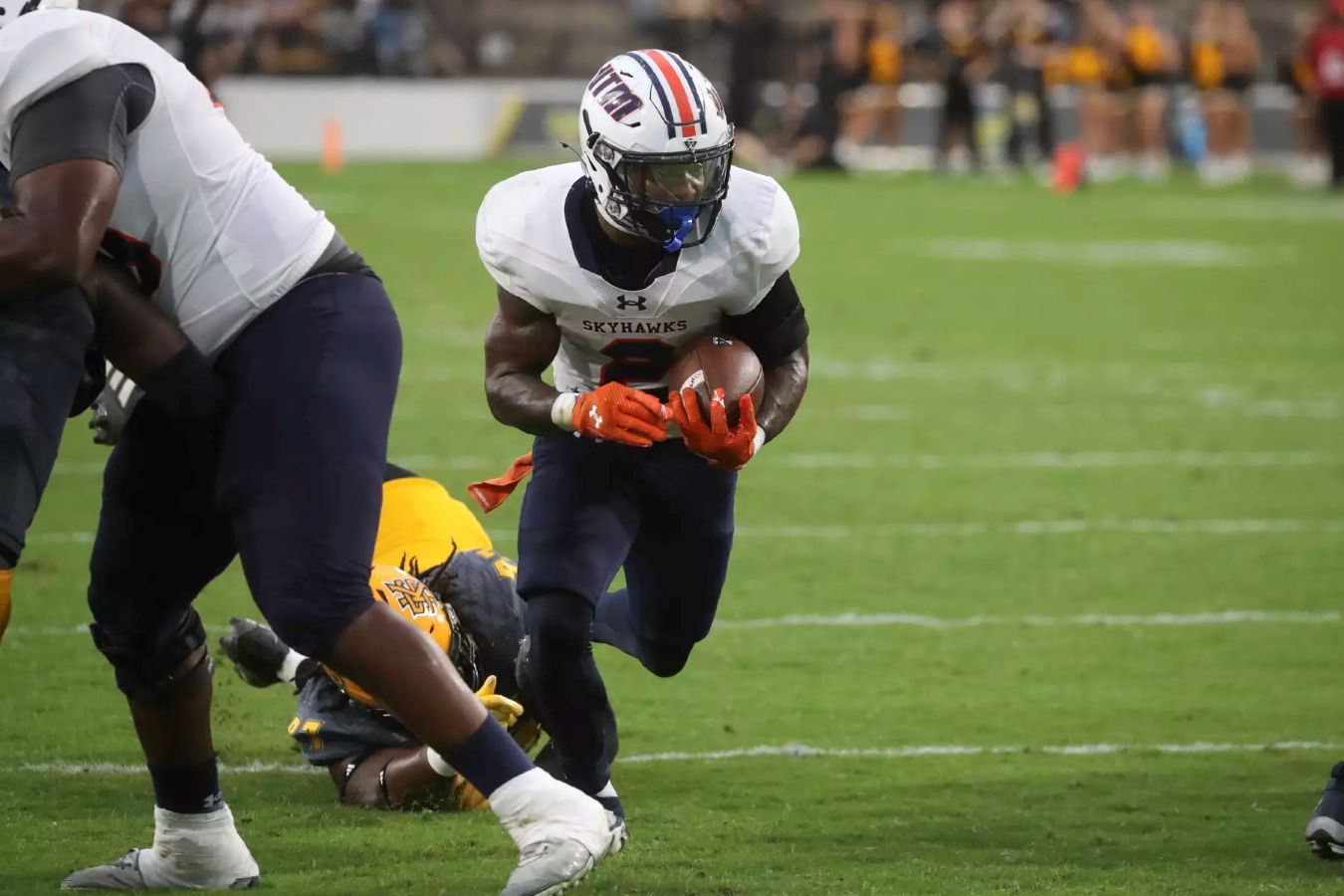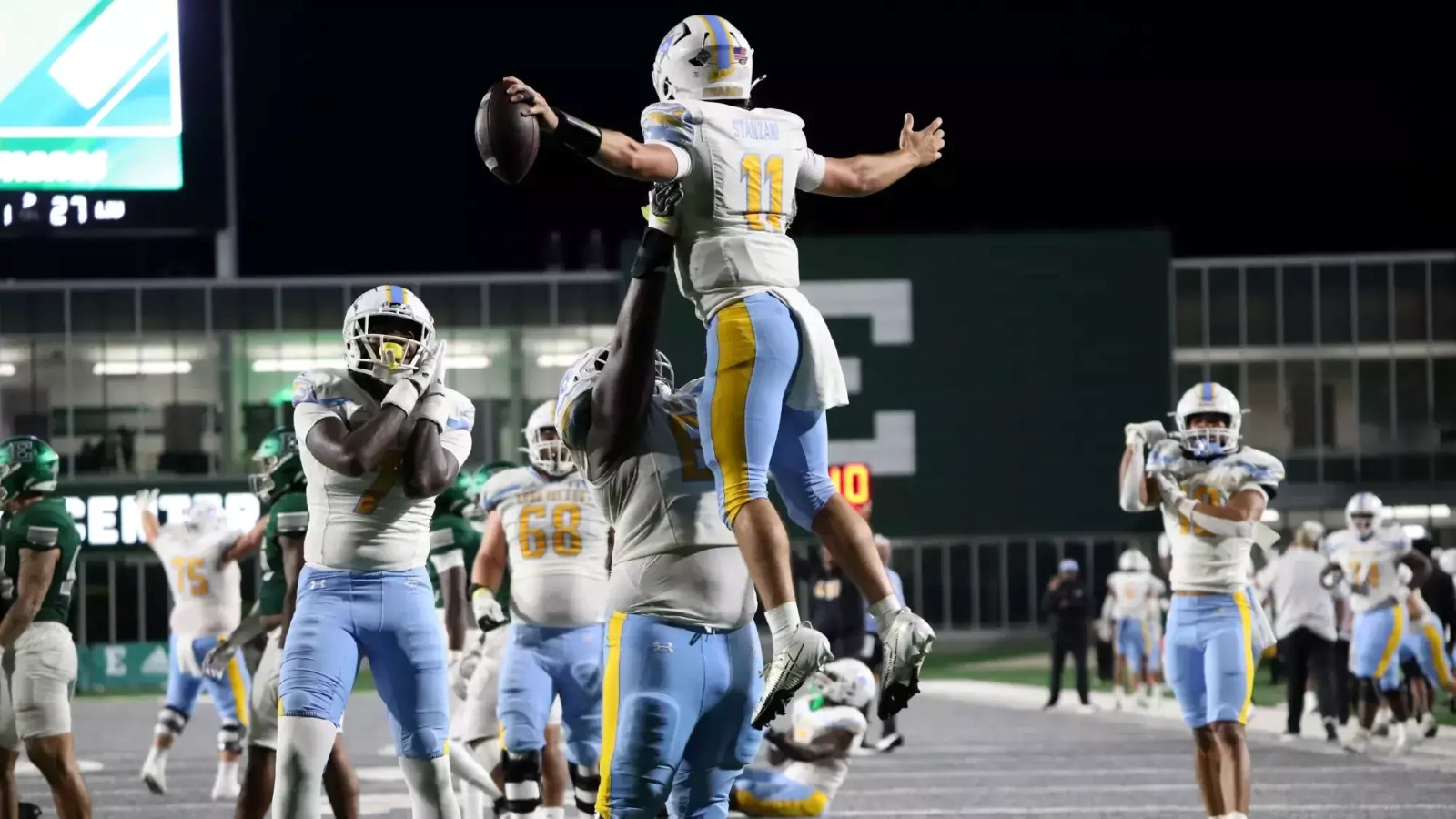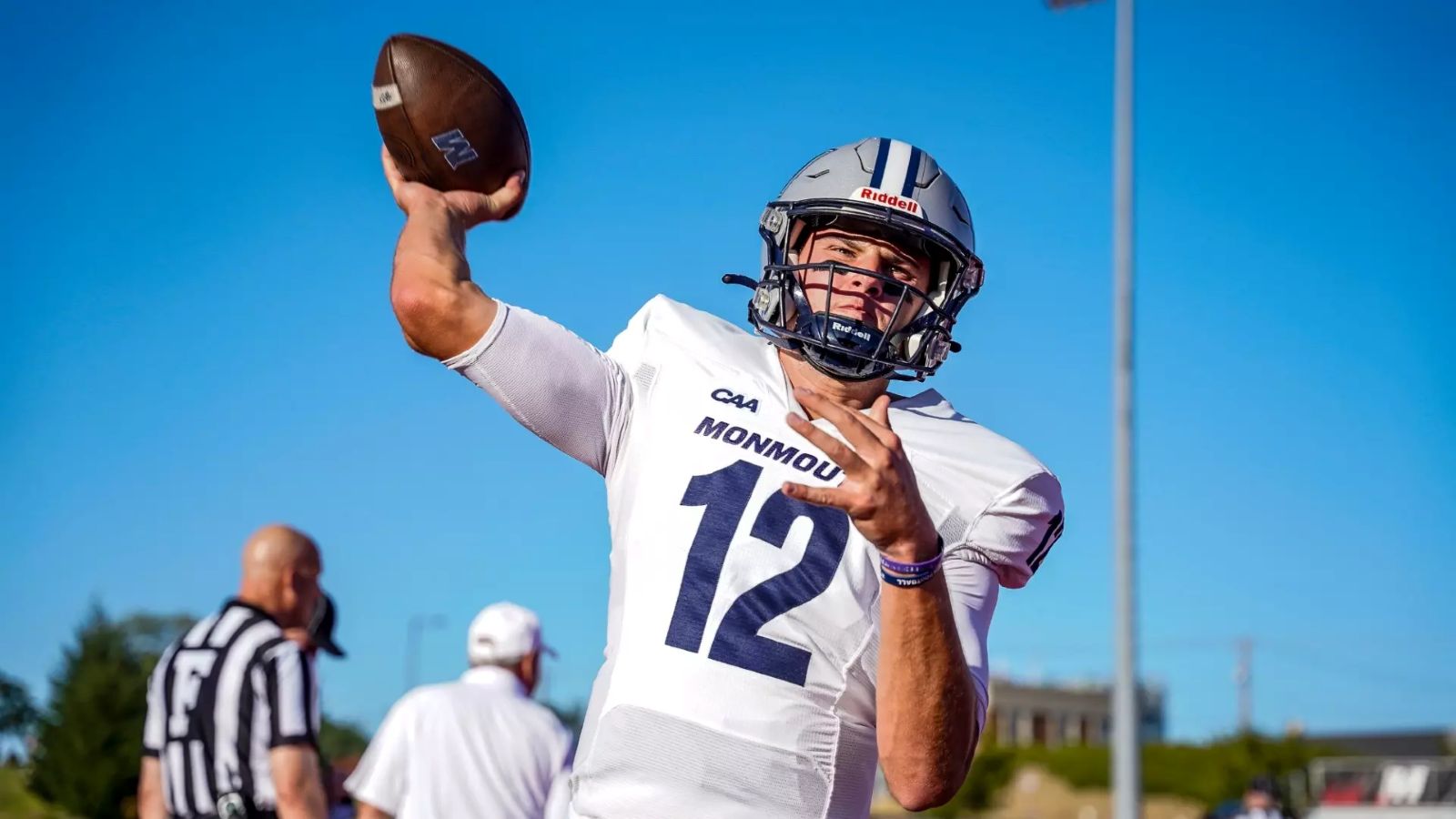With the 2024 FCS Playoffs on the horizon, FCS bracketology is ramping up, to say nothing of the non-stop discussions on which teams should be in or out of the bracket once it is released. One of the talking points when talking about the FCS Playoffs is how much weight should be placed on an FCS team that defeats an FBS opponent or whether playing an FBS team to a close loss has an impact. That’s what this article is set to quantify: does playing an FBS team matter for FCS schools? Does a close game impact the playoff chances? Are big losses to FBS teams actually ignored by the selection committee? Do FCS-FBS results bear fruit in the FCS Playoffs? Before diving into the results, let’s detail the methodology and data used in this analysis.
Data and Methodology
Fear The FCS has documented every FCS versus FBS game dating back to the Division I split in 1978 and this analysis includes all FCS-FBS matchups through the 2023 season (3,462 games and 490 FCS over FBS wins). Every FCS Playoff game has been documented along with every team that has been in the FCS/I-AA since 1978 (including former teams) to allow for a complete analysis of 768 FCS Playoff games. Two datasets will be used throughout the analysis: one for the 1978 through 2009 seasons and another for the 2010 through 2023 seasons. To make sure the two sample sets are roughly in line, here are the percentages of FCS versus FBS games and FCS Playoff games played for both eras. Coincidentally, both line up well with 58% of all FCS-FBS games and 59% of all FCS Playoff games played between 1978 and 2009 compared to 42% of all FCS-FBS matchups and 41% of all FCS Playoff games played from 2010 through 2023. There’s a high disparity of FCS over FBS wins between the two eras, which will be discussed near the end of the analysis.
Accounting for the 2020-21 Season
The 2020-21 season was the most abnormal FCS season on record due to the COVID-19 pandemic. The majority of games were shifted from Fall 2020 to Spring 2021 but some teams still opted to play games in the fall against FBS opponents. Some teams played games only in Fall 2020, a majority played only in Spring 2021, a few teams played in Fall 2020 and Spring 2021, and some teams didn’t play at all across the 2020-21 season. All that would have made it easy to exclude the 2020-21 season but the ultimate decision was to include all teams that played at least one game and exclude schools that didn’t play any games.
Abstentions (the Ivy League Problem) and Ineligible Teams
One interesting quirk of the FCS is that not every conference participates in the FCS playoffs. The MEAC and SWAC Champions have competed in the Celebration Bowl since 2015 but the MEAC previously had an automatic berth into the FCS Playoffs before 2015. In addition, MEAC and SWAC teams not committed to a postseason contest are eligible for at-large berths so it makes sense to include them in the total numbers. For the Ivy League, the conference simply abstains from the postseason for “academic reasons” (for now possibly?) but also doesn’t typically play FBS teams as there have only been 28 games since the conference moved to I-AA/FCS in 1982. As a compromise, two results are provided for both eras from 1978 through 2009 and 2010 through 2023: one chart will have the Ivy League teams included that will have (With Ivy) and the other will exclude the Ivy League (No Ivy).
Then there’s the issue of non-scholarship conferences and programs, which were historically only eligible for at-large berths but rarely received an invite. For simplicity, these schools are included because they were technically “eligible” for the FCS Playoffs and further context and discussion on the non-scholarship teams can be found in the caveats section. Relatedly, accounting for ineligible teams is another potential issue. Given the dearth of accurate lists regarding ineligible teams on a year-to-year basis, it was difficult to determine which teams should be included or excluded. This is particularly true for the first three decades of the subdivision’s history when the reclassification process was far less defined than it is now. There is typically never more than a handful of ineligible teams in a season and given the large numbers, no teams were excluded based on ineligibility.
Does Playing an FBS Team Help an FCS Team’s Playoff Hopes?
Below is a chart showing two categories: on the left is the percentage of teams that accounted for the playoff bracket size and on the right is the percentage of that category to reach the FCS Playoffs. For example, the green column on the left chart is for FCS teams that defeated an FBS opponent, which accounts for 23% of all FCS Playoff bids between 1978 and 2023. The green column on the right chart shows that 42% of all FCS teams that have defeated an FBS opponent have made the FCS Playoffs between 1978 and 2023.
There are a few conclusions to these two charts. First, given how uncommon FCS over FBS victories are (currently under 14% all-time), teams that defeat an FBS team will make up a smaller percentage of the FCS playoff bracket compared to FCS teams that lose to an FBS opponent. Intuitively, due to the high number of FCS teams that lose FBS matchups that category will have a higher percentage comprising the FCS playoff bracket. However, when the percentages focus on each individual category, it becomes clear how much more impactful an FCS over FBS victory is. An FCS team that has a win over the FBS is roughly 2.5 times more likely to make the FCS playoffs compared to an FCS team that does not have a win over the FBS or nearly 4 times more likely than a team that didn’t play an FBS opponent. It’s a task that’s easier said than done for FCS programs, especially in an era with vast differences between the subdivisions.
The percentages on the chart to the right will not add up to 100% because there are only 24 playoff spots each year and if there are 100 FCS teams that lose to FBS opponents, that means at least 76% would be left out. It’s also worth pointing out that FCS teams not playing any FBS team produce the worst result: only 9% of teams reach the FCS playoffs. When we exclude the Ivy League teams, the percentage rises to 11%. Let’s compare these two charts to the Frisco era from 2010 through 2023.
The obvious takeaway: beating an FBS opponent means an FCS team is more likely than not to make the FCS playoffs. In the Frisco era that means a team is 3 times more likely to reach the playoffs. All three categories saw an increase in percentages due to the increased number of bids with 2009 being the last year of the 16-team era (the 2020-21 16-team playoff notwithstanding). The 2010 through 2012 FCS Playoffs had 20 playoff teams and the 2013 through 2023 brackets (except 2020) had 24 teams. The Frisco era also overlaps with an increased number of FCS versus FBS matchups, which might partially explain the higher percentage of FCS over FBS winning teams making the playoffs as it becomes a rarer feat.
Now let’s compare the two eras of 1978 through 2009 on the left and 2010 through 2023 on the right so as not to double count the Frisco era. All subsequent charts will have the same era breakdown of 1978 – 2009 and 2010 through 2023 as well as the (With Ivy) or (No Ivy) designation where applicable. The expanded playoff era coincides with a higher percentage of FCS teams that have a win over the FBS making the playoffs compared to the 1978 through 2009 seasons. Meanwhile, teams that don’t play against FBS competition make the playoffs slightly less often than teams that lose to an FBS opponent. Is the difference between those two categories potentially correlated with close losses by an FCS team against FBS competition?
Does a Close Loss to an FBS Team Make a Difference?
When FCS Playoff bracketology comes around, teams are typically given a lot of credibility if they defeat an FBS opponent. That makes sense given the differences between the subdivisions but what about a close loss? Does that have an impact? For this analysis, a close loss is any game that the FCS lost by one score or less (8 points) and that will be compared to games in which FCS teams lost by 9 points or more. For further comparison, losses by 3+ scores (17 or more points) are provided along with FCS teams that didn’t play an FBS opponent.
If you are an FCS team with playoff hopes and you are going to lose to the FBS, your best chance is to keep the game close. Wow, thanks Captain Obvious! Note that FCS teams with a close loss to the FBS only make the FCS playoffs less than one-third of the time. Big losses do not have a noticeable impact, which is not surprising for the same reasons mentioned above: the expectation is that most FCS teams will lose to the FBS opponents due to the differences in subdivisions. Looking at both eras, there’s a negligible difference for teams that lose by 2+ scores, 3+ scores, or not even playing an FBS team. When removing the close losses from the overall sample of FCS to FBS losses, the percentage of FCS teams that lose and make the FCS playoffs is 13%, which is in line with other non-FBS win categories. It appears FCS teams have not been penalized for blowouts against the FBS, at least based on this simple analysis.
Does Beating an FBS Team Help During the FCS Playoffs?
Unsurprisingly, defeating an FBS team or playing them within one score improves an FCS team’s chance to make the FCS playoffs but does it matter during the playoffs? It’s time for another chart to help answer the question that shows the same four categories as before but measures the percentage of winners and runners-up for the playoffs held from 1978 through 2009 and the Frisco Era playoffs from 2010 through 2023. Note that this chart has an additional column in green that measures any FCS team to play against the FBS regardless of outcome. The other three bars are for the three separate categories of defeating the FBS, losing to the FBS, and not playing the FCS (numbers over 100% are due to rounding).
Between 1978 and 2009, an FCS team simply playing an FBS opponent usually resulted in a trip to the National Championship game but given how often the FCS-FBS matchup happens, it’s not a revelation. In the Frisco era, teams that have defeated an FBS opponent have been as equally like to win as teams that didn’t play an FBS opponent but there’s a small sample size asterisk to this stat with only 14 champions. Nevertheless, there is a correlation between teams winning against the FBS and reaching the national championship since 1978 but it has become less pronounced in the Frisco era.
Caveats
This analysis would not be complete without addressing some obvious shortcomings. First, the vast majority of FCS-FBS games take place in the first month of the season, which means there are anywhere from 7 to 10 games to be played after the FCS-FBS matchup. A majority of the remaining games will be conference matchups, which is the preferred path for coaches and schools to receive an automatic bid instead of relying upon the coin flip of an FBS win (or worse with an FBS loss) to make the playoffs. The other portion missing from this analysis is non-conference games, which are far more likely to play a larger factor in determining which bubble teams make the FCS playoffs.
Furthermore, a lot can happen throughout a season that has a larger impact on a team’s FCS playoff chances such as injuries, luck, or fluctuations during FCS/conference games. It’s nearly impossible to capture those within this analysis along with other factors like a conference’s strength during a season (or over time) or changes in the selection committee’s process that change year-over-year to reflect each season’s unique outcomes. Extrapolating those factors on a season-to-season basis is difficult, let alone attempting to quantify for over 46 seasons.
Another flaw is the issue of non-scholarship teams, which impacts the sample size. Historically, these teams did not have an automatic qualifying bid to the FCS Playoffs but were considered “eligible” for at-large berths although they weren’t selected. This was partially rectified in 2013 when the non-scholarship Pioneer Football League began receiving an annual automatic bid to the FCS Playoffs but the PFL hasn’t received an at-large bid since then. While the PFL is currently the only FCS conference competing in the FCS Playoffs that does not allow scholarships, other conferences like the MAAC (no longer sponsors football), the Northeast Conference (changed bylaws to allow scholarships), and the Patriot League (changed bylaws to allow scholarships) previously had a no scholarship policy. However, the Patriot League didn’t allow scholarships until the 2013 season but appeared in the FCS Playoffs annually since the 1997 season. Ultimately, there’s no simple solution to curating a perfect list of which teams should or should not be included in the data set, especially with data going back to the late 1970s but that’s not the only reason…
Does Defeating an FBS Opponent Matter for the FCS Playoffs?
On a closing note, the key takeaways should probably be based on the Frisco era because it’s a better representation of current FCS football than the 1978 through 2009 seasons. Not only do they include the expanded playoffs, but the rules have changed in the last 15 years especially compared to the start of the subdivision. The selection committee criteria are still more representative of the current FCS era, even if there’s controversy surrounding the final teams placed in the bracket, seeds, host bids, etc. The resource disparity between the FCS and FBS continues to grow and wasn’t as prevalent in the first 15 years of Division I-AA/FCS compared to recent seasons. Finally, as the Frisco era has seen an increased number of FCS-FBS matchups annually, it’s no surprise the uncommon FCS over FBS win will have a larger impact on FCS playoff berths compared to 1978 through 2009.
To answer the central question of the article on whether defeating an FBS opponent matters for the FCS Playoffs? It depends. When an FCS team is trying to make the playoffs, the answer is yes, it makes a difference. Looking specifically at the Frisco Era since 2010, 55% of all FCS teams that have defeated an FBS opponent made the playoffs. That’s a minimum of three times better than any other category. Yes, teams that defeat the FBS are typically better and will probably perform better in the conference slate but it’s not a guarantee. 21% of all FCS over FBS winners have claimed an AQ spot in the Frisco era compared to 7% for FCS teams without an FBS win and 9% of those without an FBS opponent (excluding the Ivy League teams). Even FCS teams that lose a one-possession game to the FBS are twice as likely to make the FCS playoffs than those who lost by 2 or more scores. There’s a strong correlation between FCS teams who win or perform well in a close loss against the FBS and reaching the FCS Playoffs and it coincides with a huge increase in the number of FCS-FBS games played annually that typically result in a slew of large FCS losses.
As for during the FCS Playoffs… it’s less likely to have a direct impact with all the conference games to be played throughout the season, which will make a larger difference. While it may not matter during the playoffs, it could matter indirectly with better seeding. When looking at the top 4 seeds between 1978 and 2009 (116 teams total), 40 had a win over the FBS, which is 34%. In the Frisco era of 2010 through 2023, it was only 14 of 56 teams (25%) top 4 seeds could claim an FBS win. When looking at only the top 2 seeds, both eras saw 40% of the top 2 teams produce a win over an FBS opponent. It’s a small difference but being a top 2 seed means that a school is potentially hosting through the semifinals, which in itself is a huge advantage. Not many schools want to travel to Bozeman, Brookings, Fargo (even with the Dome), or Missoula with a trip to Frisco on the line.
This analysis won’t help FCS schools perform any better against the FBS or during the playoffs but hopefully it quantifies the FCS-FBS matchup’s impact on FCS Playoff selections and provides meaningful context to the FCS Playoff bracketology discussions.
Photo Credit to the University of Tennessee at Martin Athletics





